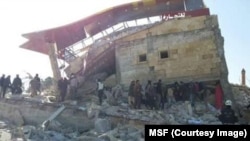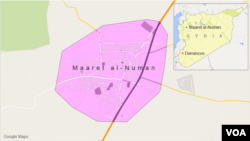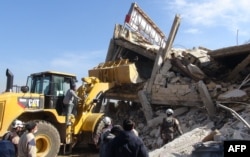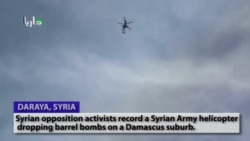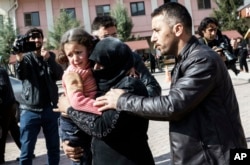The United Nations says nearly 50 civilians, including children, were killed Monday in missile attacks on medical facilities and schools in northern Syria.
"Such attacks are a blatant violation of international laws," U.N. Secretary General Ban Ki-Moon said, according to his spokesman.
A 30-bed hospital run by Doctors Without Borders was destroyed Monday while three other medical facilities were damaged in northern Syria by what rebels battling the Assad government claim were targeted airstrikes by the regime.
The charity group said the strike at Maarat al-Numan in Idlib province killed seven people. The group known by its French initials, MSF, said the hospital was hit four times in two attacks, leaving at least eight staff members missing.
"This appears to be a deliberate attack on a health structure, and we condemn this attack in the strongest possible terms,” said Massimiliano Rebaudengo, MSF’s Head of Mission.
“The destruction of the hospital leaves the local population of around 40,000 people without access to medical services in an active zone of conflict,” said Massimiliano.
Medics and witnesses say at least 10 people were killed at a maternity and pediatric clinic hit by missiles and rockets in the border town of Azaz.
Condemnation, calls for cease-fire
The U.S. State Department condemned the attacks.
"We call again on all parties to cease attacks on civilians and take immediate steps to grant humanitarian access and the cessation of hostilities that the Syrian people desperately need," spokesman John Kirby said.
An official with the U.S-led coalition against Islamic State (Col. Chris Garver) stressed on Twitter there were no coalition aircraft operating near the medical facilities that were attacked.
According to political activists, warplanes also targeted the hospitals in Maaret al-Numan and Orem Al-Kubra. Another airstrike in the northern Aleppo countryside left a school sheltering displaced Syrians from nearby towns seriously damaged with an unknown loss of life, according to Mazin Ibrahim, a relief worker. Another school in the region was also hit, according to the U.N.
As a precaution, staff shuttered the National Hospital at Maaret al-Numan and a clinic.
Dr. Wasel al-Jurk told VOA by phone, “We closed because we feared we would be hit, too. We evacuated the patients as best we could.”
Meanwhile, the European Union is calling on aggressors to halt attacks in Syria and respect a fragile cease-fire agreement reached in Munich, after the United Nations reported four hospitals were attacked in northern Syria.
European foreign policy chief Federica Mogherini called the airstrikes on the Syrian hospitals Monday “completely unacceptable,” and repeated calls for all parties involved to stop hostilities and allow humanitarian aid to pass.
But she suggested a cease-fire deal reached in Germany just days ago is still relevant.
“We will probably continue to face some setbacks. This is not a reason to change policy after just four days,” said Mogherini.
Syria topped the agenda of European Union foreign ministers who met in Brussels, and bilateral talks later in the day between Mogherini and Iranian Foreign Minister Mohammad Javad Zarif. Iran is a close ally of Syrian President Bashar al Assad.
Humanitarian group Doctors Without Borders has blamed Syria’s government or Russia for airstrikes on one of its facilities. Reports suggest the strikes also hit schools. The United Nations says dozens of people were killed in the strikes.
There is also concern over Turkey's actions. Ankara has vowed a harsh reaction against Kurdish militia fighters in northern Syria if they capture a town near the Turkish border.
During a press conference in Brussels, Iran’s Zarif also urged fighting in Syria to stop. On resuming ties with the European Union after the lifting of international sanctions against Iran, he said things were "moving in the right direction."
"There are psychological elements that need to be addressed. I believe that European countries, European governments need to provide greater assurances to their financial institutions that we have a new situation.”
Mogherini said the European Union has published clear guidelines on doing business with Iran.
WATCH: Helicopter drops barrel bombs over Daraya, Syria
Hopes dimming
The strikes come days after Russia and other world powers agreed to a limited cessation of hostilities in Syria, but hopes are dimming there will be any decrease in violence. Almost five years of civil war in Syria have led to the deaths of upwards of 250,000 people and displaced more than 11 million.
While it has not been confirmed who carried out these latest attacks, Mego Terzian, president of MSF France, said the Maarat al-Numan strikes were carried out by forces “loyal to President Bashar al-Assad.”
And the London-based Syrian Observatory for Human Rights, which monitors violence in Syria, said the airstrikes were believed to have been carried out by Russian jets.
UNICEF appalled
The airstrikes were condemned by Anthony Lake, executive director of the U.N. children's agency, UNICEF. “We at UNICEF are appalled by reports of attacks against four medical facilities in Syria — two of which were supported by UNICEF,” he said.
“Two of the strikes occurred at Azaz in Aleppo and another two in Idlib, where one of the hospitals was reportedly struck four times," he added. "In addition, there are reports that two schools were attacked at Azaz reportedly killing six children.”
Fear of new offensive
Rebel commanders fear the airstrikes targeting hospitals herald the start of an offensive in Idlib. “The pattern has been for hospitals and civilian structures to be struck first,” said Mohammed Adeeb of the Shamiya Front, a rebel militia alliance.
The purpose, he argued, is to sow panic, encourage civilian flight and lower the morale of fighters, who start focusing on how to get their families to safety.
Soon after the airstrikes on the pediatric hospital in Azaz, there were steady streams of ambulances transporting the wounded across the border with Turkey to the hospital at Kilis. As the wounded were carried out, Syrian refugees already in Turkey and camera crews crowded around.
Wounded transported to Turkey
The Kilis hospital admitted 36 of the wounded from Syria, three died.
Speaking with VOA outside Kilis hospital, he said his staff had told him the Shahid Ismail school was hit Monday in a missile strike, where many displaced families were seeking sanctuary from the Russian-backed offensive sweeping through the northern countryside of Aleppo.
“They say there are many dead but we don’t know how many,” he added. "There are people buried in the rubble and we can’t get to them."
Related Interactive
VOA United Nations correspondent Margaret Besheer and Lisa Bryant contributed to this report.




